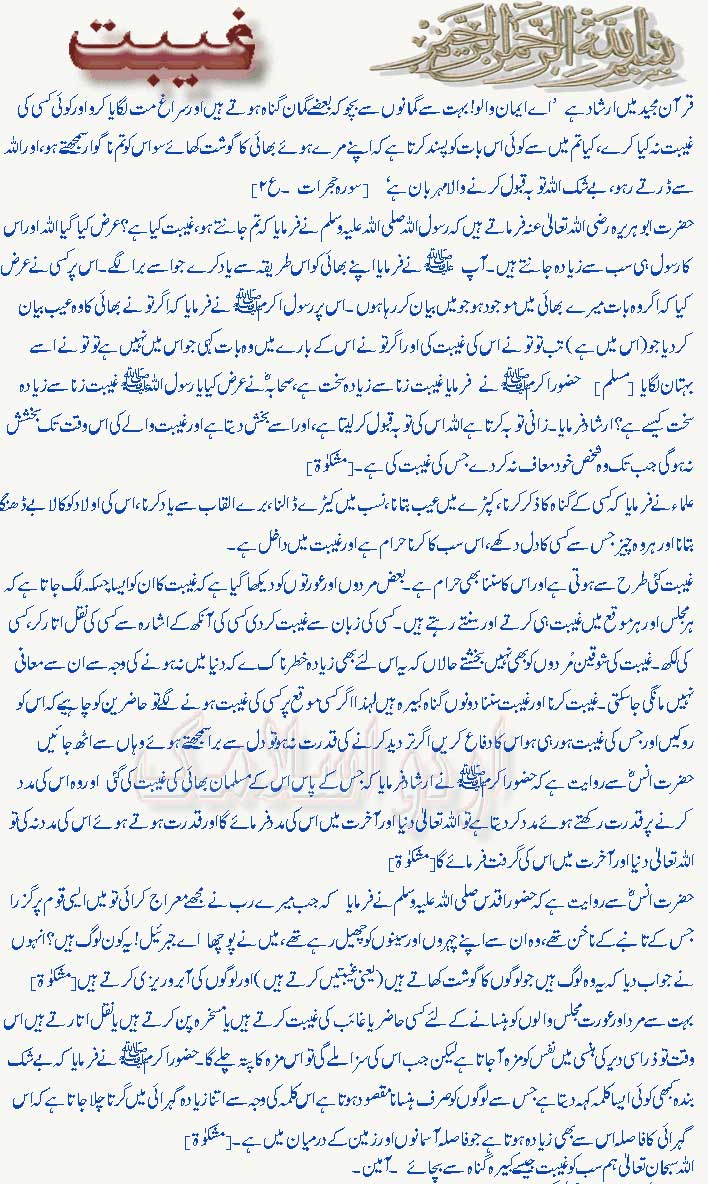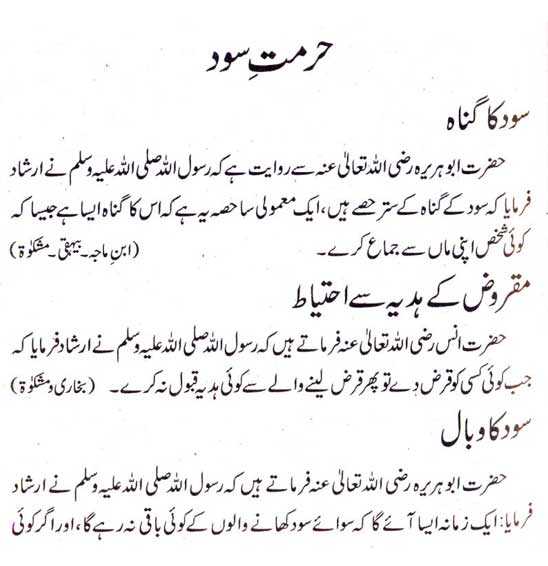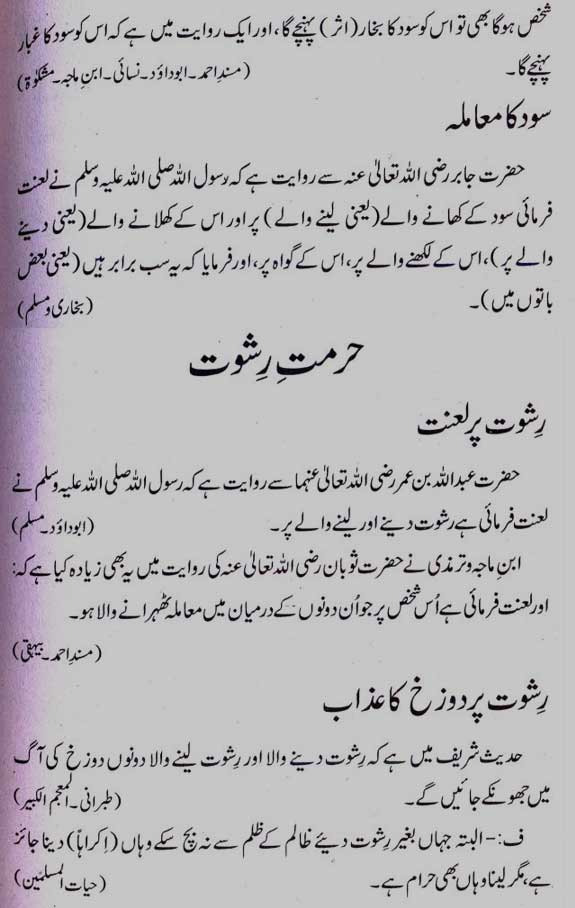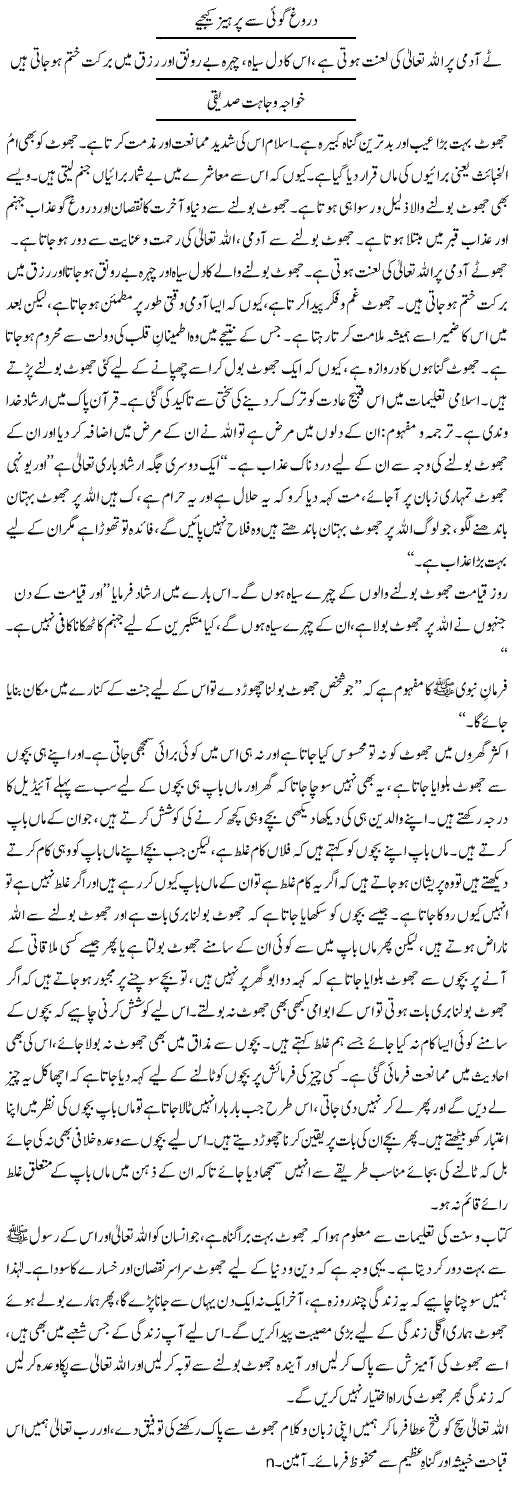
Gheebat
Gossip And Backbiting
The Prophet (peace and blessings of Allah be upon him) explained the meaning of an ayah.
He said: “Do you know what gheebah (gossip or backbiting) is?”
They said, “Allah and His Messenger know best.”
He said: “To say something about your brother that he does not want to be said.”
He was asked, “What do you think if what is said about him is true?”
He said, “If what you say about him is true, this is backbiting, and if what you say about him is not true, this is a lie.”
(Reported by Muslim, 4/2001).
Gossip or backbiting means saying something about a Muslim which may be true but which he does not like to hear spoken, whether it be about his physical appearance, his adherence to religion, his worldly affairs, his self, his behavior or his character.
There are many forms of gossip, including talking about a person’s faults and imitating him to make fun of him.
People take the matter of gheebah very lightly, although it is very serious in the sight of Allah, as is indicated by the words of the Prophet (peace and blessings of Allah be upon him):
“There are seventy-two forms of riba, the least of which is as bad as a man having intercourse with his own mother, and the worst of which is when a man slanders the honor of his brother.”
(Silsilah al-Saheeh, 1871).
(peace and blessings of Allah be upon him) encouraged us to do this when he said:
“Whoever defends the honor of his Muslim brother, Allah will protect his face from the Fire on the Day of Resurrection.”
(Reported by Ahmad, 6/450; see also Saheeh al-Jaami’, 6238).
- April, 25
- 2836
- Human Rights
- More
How To Win The Heart Of Husband?
10. Use your `Fitnah’ to win the heart of your husband
All women have the ornaments that Allah blessed them with. Use the beauty Allah – Azza wa Jal – has bestowed you with to win the heart of your husband.
9. When your husband comes home, greet him with a wonderful greeting
Imagine your husband coming home to a clean house, an exquisitely dressed wife, a dinner prepared with care, children clean and sweet smelling, and a clean bedroom – what would this do to his love for you? Now imagine what the opposite does to him.
8. Review the characteristics of the Hoor Al-Ayn and try to imitate them
The Qur’an and Sunnah describe the women in Jannah with certain characteristics. Such as the silk they wear, their large dark eyes, their singing to their husband, etc. Try it, wear silk for your husband, put Kohl in your eyes to `enlarge’ them, and sing to your husband.
7. Always wear jewelry and dress up in the house.
From the early years, little girls have adorned themselves with earrings and bracelets and worn pretty dresses – as described in the Qur’an. As a wife, continue to use the jewelry that you have and the pretty dresses for your husband.
6. Joke and play games with your husband.
A man’s secret: they seek women who are lighthearted and have a sense of humor. As Rasul Allah – sal Allahu alayhi wa sallam – told Jabir to marry someone who would make him laugh and he would make her laugh.
5. Thank your husband constantly for the nice things he does. Then thank him again.
This is one of the most important techniques, as the opposite is a characteristic of the women of hellfire.
4. An argument is a fire in the house. Extinguish it with a simple `I’m sorry’ even if it is not your fault.
When you fight back, you are only adding wood to the fire. Watch how sweetly an argument will end when you just say sincerely, “Look, I’m sorry. Let’s be friends.”
3. Always seek to please your husband, for he is your key to Jannah.
Rasul Allah – sal Allahu alayhi wa sallam – taught us that any woman who dies in a state where her husband is pleased with her shall enter Jannah. So .. please him.
2. Listen and Obey!
Obeying your husband is Fard! Your husband is the Ameer of the household. Give him that right and respect.
1. Make Dua to Allah to make your marriage and relationship successful.
All good things are from Allah. Never forget to ask Allah ta’ala for the blessing of having a successful marriage that begins in this Dunya and continues on – by the Mercy of Allah ta’ala – into Jannah.
And Allah knows best
- April, 24
- 3616
- Human Rights
- More
Description Of The People Of Paradise And The Delights They Enjoy Therein
The people of Paradise will enter in the most perfect and beautiful form, in the image of their father, Aadam (as), for there is no human form more perfect and beautiful than that of Aadam, whom Allah (SWT) created very tall. He was as tall as a great palm tree, sixty cubits tall. Muslim reports from Abu Hurayrah (ra) that the Messenger of Allah (SAW) said,
“Allah, Subhaanahu wa ta’aala, created Aadam in his own image, sixty cubits tall… everyone who enters Paradise will be in the image of Aadam, sixty cubits tall. People kept getting shorter and shorter after the time of Aadam.” [Saheeh Muslim, Kitaab al-Jannah, Baab Yadkhul al-Jannah Aqwam Af’idatuhum mithl af’idatah at-Tayr 4:2183, no. 2841]
Their external appearance will be in harmony, and their hearts will be as one. Their hearts and souls will be clean and pure. Muslim reports from Abu Hurayrah (ra) a hadith in which the Prophet describes people entering Paradise including a group whose light will be like the full moon. He (saw) said, “Their form will be that of a single person, after the image of their father Adam, sixty cubits tall.” [Saheeh Muslim, Kitaab al-Jannah, Baab Awwal zumrah yadkhuluna al-Jannah, 4/2179, no. 2834]
Another aspect of their beauty is that they will have no body hair, and will look as if their eyes are anointed with kohl. Each of them will enter Paradise aged thirty-three, the age of strength, vitality, and youth. Ahmad and at-Tirmidhi report from Mu’aadh ibn Jabal that the Messenger of Allah (saw) said, “The people of Paradise will enter Paradise hairless, looking as if their eyes are ringed with kohl, aged thirty-three.” [Saheeh al-Jaami’ 6/337, no. 7928]
As reported in the hadith narrated by al-Bukhaari and Muslim, from Abu Hurayrah (ra), the people of Paradise “will not spit, blow their noses or excrete“.
The people of Paradise will not sleep. Jaabir ibn ‘Abdullaah and ‘Abdullaah ibn Abi Awfaa reported that the Messenger of Allah (saw) said, “Sleep is the brother of death; the people of Paradise will not sleep” [Silsilat al-Hadith as-Saheehah, 3/74, no. 1087, al-Kaamil of Ibn ‘Adiyy, al-Hilyah of Abu Na’eem, Taareekh Isbahaan, by Abul-Sheikh]
- April, 23
- 2914
- Paradise-Hell
- More
Hurmat e Sood


Hurmat e Sood
Taking A Shower On Friday
During the lifetime of the Prophet (peace be upon him), Muslims mostly endured hard times, with many Arabian tribes and other forces lined up against them.
Moreover, they suffered economic siege for long periods. Therefore, they were mostly poor. Their clothes were simple, rough, and hardly suitable for the climate. Many did not have more than one robe which they would wear every day, at work and other places. With the hot climate in Arabia, they were bound to sweat. This often gave them a bad smell. When they came to the mosque, particularly on Friday, the smell was often too sharp for comfort. Some of them complained to the Prophet. He advised all his companions to take a shower on Friday before coming to the prayer.
Abu Said Al-Khudri reports: “I bear witness that God’s messenger (peace be upon him) said: ‘Taking a bath on Friday is a duty on everyone who has attained puberty, as is cleaning his teeth and wearing some perfume if he finds it’.” (Related by Al-Bukhari).
This Hadith is the strongest with regard to the standards of cleanliness that we should observe on Friday. There are other Hadiths that may give more details, but they make clear that such actions are strongly recommended, not duties. The difference is that a duty involves clear instructions that must be obeyed. If it is not, then the person who neglects it leaves himself open to punishment by God. A recommended action is less important. It earns reward for us when we do it because by doing it we show our obedience to God and His messenger. If we fail to do it, we incur no sin and are liable to no punishment, but we deprive ourselves of the reward that goes with it.
The great majority of scholars are of the view that taking a bath or shower on Friday is strongly recommended, before going out to attend the Friday prayer, which must be offered in congregation. The Prophet also recommended we to use a toothbrush to clean our teeth and mouths. This would ensure that no one will have a bad mouth smell when they come to the mosque. In addition, he has recommended us to wear some perfume. He made it clear that this is recommended, adding the phrase “if he finds it” to indicate that it is not obligatory.
Scholars agree that all these actions should be done before we go out to attend the Friday prayer, which falls due just after midday. However, if one takes a bath early, or at any time after dawn prayers, he does well. Needless to say, the closer one does this to the time of Friday prayer, the better. However, the matter is left to people’s convenience. It may be that an earlier bath is more convenient for some people, particularly when several adults live in the same house. If they all want to take a bath shortly before the prayer, they may be in each other’s way.
It must be made clear that taking a bath or shower on Friday applies to everyone who attends the prayer, man or woman. It does not apply to children, below the age of puberty, because prayer is not obligatory to them. However, if they are going to the mosque, it is better if they are instructed to take a bath so that they develop this habit at an early age. Friday prayer in the mosque is not obligatory for women, but they are welcome to attend it if they so wish. They are also recommended to follow the same practices of cleanliness.
– By Adil Salahi
How Friendly And Likeable Is Your Behavior?
The Muslim who truly understands the teachings of his religion is gentle, friendly, and likable. He mixes with people and gets along with them. This is something that should be a characteristic of the Muslim who understands that keeping in touch with people and earning their trust is one of the most important duties of a Muslim.
It is an effective means of conveying the message of truth to them, and exposing them to its moral values, because people only listen to those whom they like, trust, and accept. Hence there are many Ahadith who commend the type of person who is friendly and liked by others. Such a person is one of those chosen ones who are beloved by the Prophet (peace be upon him) and will be closest to him on the Day of Resurrection.
“Shall I not tell you who among you is most beloved to me and will be closest to me on the Day of Resurrection?” He repeated it two or three times, and they said, “Yes, O Messenger of Allah (peace be upon him).” He said, “Those of you who are the best in manners and character.” (Ahmad; authentic) Some reports add, “Those who are down-to-earth and humble, who get along with others and with whom others feel comfortable.”
One of the attributes of the believer is that he gets along with others and others feel comfortable with him.
The Prophet (peace be upon him) said, “The believer gets along with people and they feel comfortable with him. There is no goodness in the one who does not get along with people and with whom they do not feel comfortable.” (Ahmad)
The Prophet (peace be upon him) set the highest example of good behavior towards people. He was skillful in softening their hearts and called them to follow him in word and deed.
He was always cheerful and easy-going, never harsh. When he came to any gathering, he would sit wherever there was an empty space, and he told others to do likewise. He treated everyone equally. If anyone came to him and asked for something, he would give it to him, or at least respond with kind words.
– The Ideal Muslim/IIPH
- April, 20
- 2923
- Human Rights
- More
Five Ways To Disobey Allah!
Ibn Qudamah Al-Maqdisi mentions a conversation between a young lad and the great scholar Ibrahim Bin Adham in his book Kitab At-Tawwabeen, page 285.
The young boy: O Abu Ishaq, I am wronging my soul, advise me with something that’ll hold me back from disobeying Allah and breathe new life into my heart.
Ibrahim Bin Adham: Alright. If you take five things from me and fulfill them, you can disobey Allah the Almighty all you want, and no harm will come to you.
Young boy: (Interested) Ok, tell me.
Ibrahim Bin Adham: One, if you want to do other than what Allah wants you to do, then do not eat the food that He provides you.
Young boy: Then where am I supposed to eat from when all the food on earth is from Allah?
Ibrahim Bin Adham: Dear lad, is it right that you eat the food Allah the Almighty has given you and then go off and disobey Him?
Young boy: No it is not right. What is the second?
Ibrahim Bin Adham: Two, if you want to live life to the fullest in disobedience of Allah, then don’t live on His land.
Young boy: That’s harder than the first. Where shall I live when all that is in the east and west belongs to Him?
Ibrahim Bin Adham: Dear boy, is it right that you eat His food and live in His land, yet still insist on turning your back when He calls you?
Young boy: No it’s not right. What’s the third?
Ibrahim Bin Adham: If you want to disobey Allah, yet still eat the food He gave you and still live in His land, then find a place where He can’t see you.
Young boy: O Abu Ishaq, how can that be so when Allah is the All-Seeing and All-Knowing of all that happens, even what the heart whispers?
Ibrahim Bin Adham: Dear boy, is it right that you eat His food and live in His land and disobey Him while He watches you and what you are exposing?
Young boy: No it’s not right. What’s the fourth?
Ibrahim Bin Adham: When the angel of death comes to snatch your soul, tell him to grant you a day so that you can sincerely ask Allah for forgiveness and change your life.
Young boy: He won’t grant me that.
Ibrahim Bin Adham: Dear boy, if you find yourself helpless to put off death for just one day and you know that it cannot be delayed by your wishes, how do you expect to win?
Young boy: (With a sigh) What is the fifth?
Ibrahim Bin Adham: When the gatekeepers of Hell will come to drag you away on your face to Hellfire refuse to go with them.
Young boy: Nothing will stop them.
Ibrahim Bin Adham: How do you expect to be saved then?
Young boy: Enough, Abu Ishaq. (And he lowers his head crying). O Allah, forgive me for my transgression.
Epilogue: Young boy went on to become a student of Ibrahim Bin Adham. He repented to Allah sincerely and lived an upright life with his teacher until death parted the two.
Imam Ibrahim Bin Adham died over a thousand years ago in the year 778 CE.
Jhoot Sey Perhaiz

Jhoot Sey Perhaiz
Give Gifts Without Expecting A Return
So often we hear people saying, “He never gives me an expensive gift. That is why I have chosen this cheap gift for him” or someone might say, “I am going to buy an expensive gift for her because she is rich. She will return it with a better one.”
Is this what exchanging gifts is all about? While saying such things we forget the real meaning of a gift. Giving a gift or present should be done without expecting any compensation.
It is a voluntary act that does not require anything in return. Therefore it is totally different from trade. In Islam, giving gifts is a virtuous deed and an expression of love, friendship, and gratitude. It is strongly recommended in the religion because it strengthens the bonds of brotherhood. Prophet Muhammad (peace be upon him) said, “Exchange gifts, as that will lead to increasing your love for one another.” (Al-Bukhari)
Looking down upon one’s gift is disliked in Islam as Prophet Muhammed (peace be upon him) said, “O Muslim women! None of you should look down upon the gift sent by her she-neighbor even if it were the trotters of the sheep (fleshless part of legs).” (Al-Bukhari)
Abu Huraira also narrated that the Prophet (peace be upon him) said, “I shall accept the invitation even if I were invited to a meal of a sheep’s trotter, and I shall accept the gift even if it were an arm or a trotter of a sheep.” (Al-Bukhari)
If we receive a gift from anyone, we are encouraged to respond by giving him or her something better than what we received. Al-Bukhari narrated that Ayesha (may Allah be pleased with her) said: “The Messenger of Allah (peace be upon him) used to accept gifts and reward people for giving them.” The Prophet (peace be upon him) said: “Whoever do you a favor, respond in kind, and if you cannot find the means of doing so, then keep praying for him until you think that you have responded in kind.” (Abu Dawood)
The Prophet of Allah (peace be upon him) disliked taking back gifts that one had already given, and strongly discouraged this habit, as is evident by the narration of Ibn Abbas (may Allah be pleased with them) who narrated that the Prophet (peace be upon him) said, “One who takes back his gift (which he has already given) is like a dog that swallows its vomit.”
The consequences of not following the Islamic etiquettes are long-lasting. If a Muslim gives a gift to a rich person expecting a better gift in return, and if this wish is not fulfilled, he might spoil his relations with his fellow Muslim because of his greater expectation.
Similarly, a person who follows Sunnah will always return the giver with something better and this creates love, friendship, and brotherhood amongst each other.
Thus when we do deeds for the sake of Allah and hoping for His reward alone, then we won’t have expectations from people, then this leads to peace of mind and success in this world and the hereafter.

